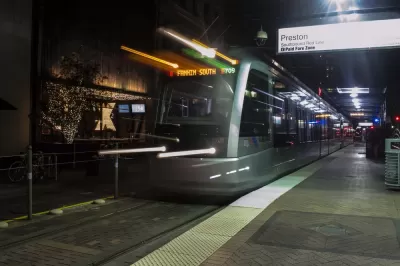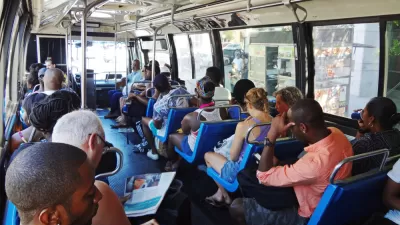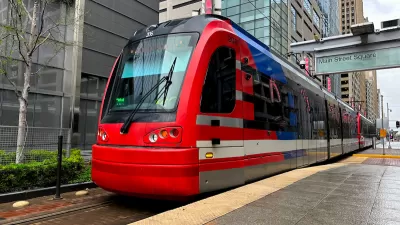A review of board members' Q Cards reveals the extent to which the people who implement Houston's transit policy actually use the system: some quite a bit, some not so much.

Following Houston voters' approval of a $3.5 billion transit bond measure, "riders have said it is critical leaders know what sort of improvements need to be built. The best way to do that, some say, is for [Metro] board members to experience it," Dug Begley writes.
But a Houston Chronicle review of Metropolitan Transit Authority board members' agency-issued Q cards reveals that some of the folks in charge aren't regular transit riders. The review "shows three Metro board members did not ride a single bus or train between Jan. 1, 2018, and Aug. 31, 2019. Other members were mixed, with some taking a handful of trips while others with different commuting locations and habits hop aboard frequently."
Sanjay Ramabhadran, one of the board members who logged the most trips, said that using the system is "an important determinant—but not the only one—board members should use" in making decisions, Begley reports. "We all bring different strengths to the board," Ramabhadran said. "Some of them might be riding the system, some of that might be financial or engineering."
Begley's write-up gives some background on each of Houston Metro's board members and outlines how often they use the system, as well as which parts of the system they tend to frequent.
FULL STORY: Metro board members will set course of $7.5B transit plan, but not all ride

Maui's Vacation Rental Debate Turns Ugly
Verbal attacks, misinformation campaigns and fistfights plague a high-stakes debate to convert thousands of vacation rentals into long-term housing.

Planetizen Federal Action Tracker
A weekly monitor of how Trump’s orders and actions are impacting planners and planning in America.

In Urban Planning, AI Prompting Could be the New Design Thinking
Creativity has long been key to great urban design. What if we see AI as our new creative partner?

How Trump's HUD Budget Proposal Would Harm Homelessness Response
Experts say the change to the HUD budget would make it more difficult to identify people who are homeless and connect them with services, and to prevent homelessness.

The Vast Potential of the Right-of-Way
One writer argues that the space between two building faces is the most important element of the built environment.

Florida Seniors Face Rising Homelessness Risk
High housing costs are pushing more seniors, many of them on a fixed income, into homelessness.
Urban Design for Planners 1: Software Tools
This six-course series explores essential urban design concepts using open source software and equips planners with the tools they need to participate fully in the urban design process.
Planning for Universal Design
Learn the tools for implementing Universal Design in planning regulations.
Gallatin County Department of Planning & Community Development
Heyer Gruel & Associates PA
JM Goldson LLC
City of Camden Redevelopment Agency
City of Astoria
Transportation Research & Education Center (TREC) at Portland State University
Jefferson Parish Government
Camden Redevelopment Agency
City of Claremont





























